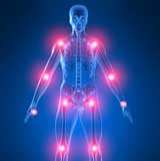Featured Health Support Products
Kidney Health Kit 2 for those concerned with:
- Glomerulonephritis
- High Creatinine Levels*
- Lowered Kidney Function*
Kidney Health Pak 2 Contains: Kidney Well II and Alisma
100% Money Back Guarantee!
What is Chronic Glomerulonephritis?
Chronic glomerulonephritis is caused when there is slow progressive destruction of the glomeruli of the kidney, with progressive loss of kidney function. Some cases are caused by specific stimuli to the body's immune system, but the precise cause of most is unknown. An as yet undefined abnormality of the immune system is believed to be responsible for most cases. It is a cause of hypertension and chronic renal failure.
Alternative Names
Glomerulonephritis - chronic; Chronic nephritis
Chronic Glomerulonephritis Definition
Chronic glomerulonephritis is the advanced stage of a group of kidney disorders, resulting in inflammation and slowly worsening destruction of internal kidney structures called glomeruli.
Read About Glomerular Support*
Chronic Glomerulonephritis Causes
Chronic glomerulonephritis occurs when there is slow, progressive destruction of the glomeruli of the kidney, with progressive loss of kidney function. In some cases, the cause is found to be a specific attack to the body's immune system, but in most cases, the cause is unknown. It is generally thought that a still-unidentified abnormality of the immune system is to blame.
Damage to the glomeruli affects the kidney's ability to filter fluids and wastes properly. This leads to blood and protein in the urine.
This condition may develop after survival of the acute phase of rapidly progressive glomerulonephritis. In about one-quarter of people with chronic glomerulonephritis there is no prior history of kidney disease, and the disorder first appears as chronic kidney failure.
Glomerulonephritis is among the leading causes of chronic kidney failure and end stage kidney disease. Causes include:
- Diabetic nephropathy/sclerosis
- Focal segmental glomerulosclerosis
- IgA nephropathy (Berger's disease)
- Lupus nephritis
- Membranous glomerulonephritis
- Mesangial proliferative disorder
- Nephritis associated with disorders such as amyloidosis, multiple myeloma, or immune disorders, including AIDS
Chronic Glomerulonephritis Symptoms
This condition causes high blood pressure (hypertension) and chronic kidney failure.
Specific symptoms include:
- Blood in the urine (dark, rust-colored, or brown urine)
- Foamy urine
Chronic kidney failure symptoms that gradually develop may include the following:
- Decreased alertness
- Drowsiness, somnolence, lethargy
- Confusion, delirium
- Coma
- Decreased sensation in the hands, feet, or other areas
- Decreased urine output
- Easy bruising or bleeding
- Fatigue
- Frequent hiccups
- General ill feeling (malaise)
- Generalized itching
- Headache
- Increased skin pigmentation -- skin may appear yellow or brown
- Muscle cramps
- Muscle twitching
- Nausea and vomiting
- Need to urinate at night
- Seizures
- Unintentional weight loss
Additional symptoms that may be associated with this disease:
- Blood in the vomit or stools
- Excessive urination
- High blood pressure
- Nosebleed
Chronic Glomerulonephritis Exams and Tests
Because symptoms develop gradually, the disorder may be discovered when there is an abnormal urinalysis during a routine physical or during an examination for another, unrelated disorder. It may be discovered as a cause of high blood pressure that is difficult to control.
Laboratory tests may reveal anemia or show signs of reduced kidney functioning, including azotemia. Later, signs of chronic kidney failure may be apparent, including edema .
Tests that may be done include:
- Chest x-ray
- Kidney or abdominal CT scan
- Kidney or abdominal ultrasound
- IVP
- Urinalysis
A kidney biopsy may show one of the forms of chronic glomerulonephritis or scarring of the glomeruli.
This disease may also alter the results of the following tests:
- Albumin
- Abdominal MRI
- Anti-glomerular basement membrane
- BUN
- Complement component 3
- Complement
- Creatinine clearance
- Renal scan
- Total protein
- Uric acid, urine
- Urine concentration test
- Urine creatinine
- Urine RBC
- Urine specific gravity
- Urine protein
Chronic Glomerulonephritis Treatment
Treatment varies depending on the cause of the disorder, and the type and severity of symptoms. The primary treatment goal is control of symptoms. High blood pressure may be difficult to control, and it is generally the most important aspect of treatment. Various medications may be used to attempt to control high blood pressure.
Corticosteroids, immunosuppressives, or other medications may be used to treat some of the causes of chronic glomerulonephritis.
Dietary restrictions on salt, fluids, protein, and other substances may be recommended to help control of high blood pressure or kidney failure.
Dialysis or kidney transplantation may be necessary to control symptoms of kidney failure and to sustain life.
Source: The National Institutes of Health Medline
Read About Kidney Health Support...*
[Top]

 Get Well Natural, LLC
Get Well Natural, LLC  Kidney Function & Regeneration Health
Kidney Function & Regeneration Health  Platelet & Blood Cell Health
Platelet & Blood Cell Health  Prostate, Flow & Function Health
Prostate, Flow & Function Health  General Mind & Body Health
General Mind & Body Health  Heart, Cholesterol & Cardio Health
Heart, Cholesterol & Cardio Health  Allergy-Free Body
Allergy-Free Body  Anxiety & Stress
Anxiety & Stress  Blood Platelet Counts & Function
Blood Platelet Counts & Function  Blood Pressure Health
Blood Pressure Health  Kidney Function Health
Kidney Function Health  Immune System Health & Balance
Immune System Health & Balance  Prostate & Urinary Health Function
Prostate & Urinary Health Function  Blood Sugar Balance
Blood Sugar Balance  Cardiovascular Heart Health
Cardiovascular Heart Health  Detoxification & Healthy Cells
Detoxification & Healthy Cells  Women's Health
Women's Health  Liver Regeneration
Liver Regeneration  Pain-Free Body
Pain-Free Body  Water & Air Filtration
Water & Air Filtration 


